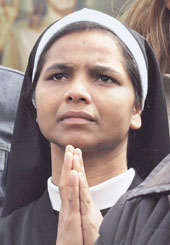 |
| Like a prayer: Clerics and nuns see no dichotomy between their ministry and the legal profession |
The battle over allowing priests and nuns to enrol for law degree courses is far from over. Last month, the Kerala High Court ruled that they could do so. But The Bar Council of India (BCI) is poised to appeal to the Supreme Court against the Kerala High Court’s verdict.
The BCI is determined to prove that priests and nuns are no exceptions to the law which permits only those who practise no other professions to become lawyers. “A lawyer’s profession is a full-time one and priests and nuns may not be able to devote that much time to it, as they are supposed to attend to the needs of the people whenever called upon to do so,” contends Gracias Kuriakose, the Bar Council of Kerala’s representative. Moreover, “priests get paid by the church for their services,” he adds.
But clerics and nuns see no dichotomy between their ministry and the legal profession. “Ours is not an office of profit,” retorts Fr Xavier Arul Raj, secretary of the Tamil Nadu legal cell of the Catholic church, which is also an advisory body of the Bishops of Tamil Nadu. Why single them out when the legal profession has trustees of temples, leading clubs and other lay humanitarian ministries, he asks.
In God’s Own Country, priests and nuns have been practising law for sometime now. But the matter became a bone of contention in 2005, when two nuns, Sister M. Tessy and Sister Tina Jose, and a priest, Father Thomas Pussery, approached the Bar Council dressed in their religious robes to apply for their licence to practise law.
That led the BCI to move the Kerala High Court, seeking a bar on priests and nuns practising law on the ground that they already practised another profession (of divinity), for which, it said, they were paid. A division bench of the Kerala High Court, however, dismissed this contention last month on the ground that priesthood or nunhood was a way of life and not a profession. The judges said: “There is a difference between doing a profession and being engaged in a profession. Engaged means earning a profit or remuneration.”
Of the several thousands of Christian priests and nuns in the country, hardly 1,000 are said to be lawyers. Hardly five per cent of these practise in court (the rest are active in raising legal awareness and in legal aid).
So what’s the fuss about? V.V. Surendran, the BCI’s legal representative in this case, cites another reason for barring them from practising law. “If they enter the judicial services, their religious affiliation will not allow them to be independent, thus affecting the independence of the judicial system,” he says.
But priests and nuns who are lawyers see a darker motive in all this. “Communal animosity to the Christian community,” says Father Nitya Sagayam, secretary of the Justice and Peace Development Commission of the Catholic church. To top it all, there’s plain old-fashioned jealousy, they add ? something that both Surendran and Kuriakose rubbish. Interestingly, even some Christian lawyers and the Church were initially opposed to nuns and priests practising law. “They could not imagine us as lawyers,” says Father Michael, a lawyer in Goa.
Many priests and nuns who are lawyers believe they are being targeted by lay lawyers who feel threatened by the fact that they (the religious lawyers) do not focus on financial gain. Father P.D. Mathew, a lawyer who practised for about 25 years in the Supreme Court, charges clients on the basis of their ability to pay or charges them nothing if they can’t afford to shell out money.
The Catholic church itself has only recently been open to priests and nuns being involved in legal practice. Says Father Sagayam, “Given the pressure from dioceses of the church, only a few priests and nuns have been permitted to practise law, full time.” One of them is Sister Jessy Kurien, who takes up human rights issues at the Supreme Court; another is the soft-spoken Sister Julie, who at the family court in Mumbai bargains for maintenance and child custody for poor women.
Nor will all priests and nuns work in court. Argues Father James, a legal activist in interior Maharashtra, “One can reach out to more people through legal education than by appearing in court.” And Father Francis Dabre arbitrates in cases that have weathered over a quarter of a century in court. Over the last four years, he has settled about a dozen cases in court through his moral authority.
Priests and nuns who are lawyers tend to work more in the development sector and in the area of reconciliation, “something that lay lawyers have no patience for,” concludes Father Mathew, who heads Lawyers for Justice, a non governmental organisation.










